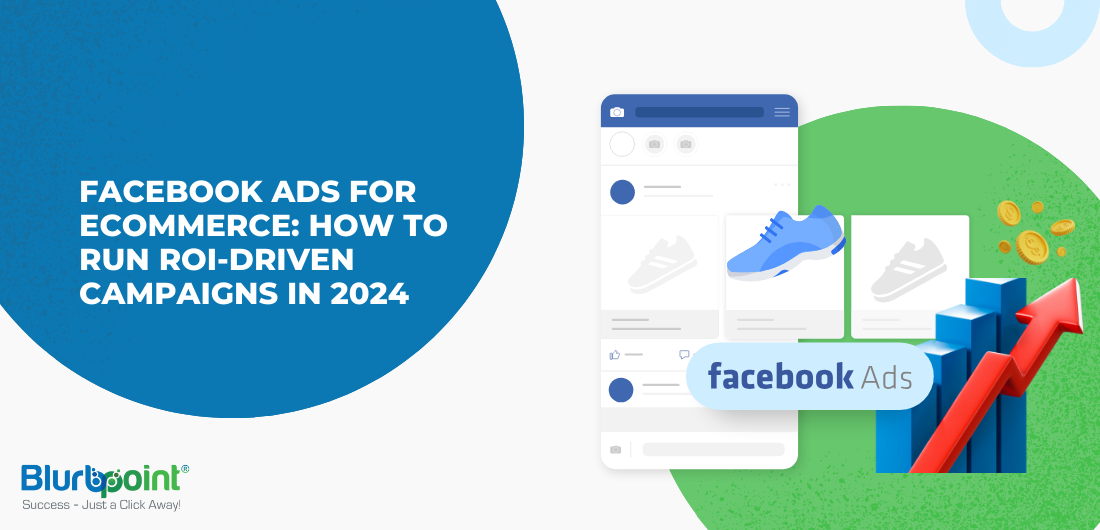GET A FREE CONSULTATION



Posted by Sandeep Sharma
February 09, 2024
The role of Facebook Ads for e-commerce businesses has become pivotal in 2024. With 2.9 billion active users in 2022 and a consistent presence as the second most-used online platform, Facebook offers an unparalleled prospecting pool for online retailers.
Yet, the organic reach of Facebook brand pages, currently hovering under 6%, underscores the urgency for businesses to leverage the sophisticated tools provided by Facebook’s ad targeting, tracking, and management features.
As of the end of last year, over 7 million businesses were engaging in Facebook advertising. This signals the platform’s enduring importance in the world of digital marketing. Let’s learn more about Facebook Ads strategy for e-commerce. It’s time to discover how Facebook advertising agencies can build result-generating campaigns.
The latest Pew Research statistics reveal that Facebook is only surpassed by YouTube, with over 60% of internet users engaging with it. The sheer scale of the audience on Facebook, with 2.9 billion active users in 2022, presents an immense prospecting pool for online retailers.
Yet, the landscape has evolved, and the organic reach of brand pages on Facebook has declined to less than 6%. Despite this, the advertising tools offered by Facebook, including robust ad targeting, tracking, and management features, are unmatched.
The statistics at the close of 2022, indicating over 7 million businesses advertising on Facebook, underscore the platform’s continued relevance and efficacy for businesses seeking to reach their target audiences.
The digital ecosystem is characterized by fleeting attention spans and a multitude of options. The question still arises: why should E-commerce businesses invest in Facebook Ads?
The answer lies in the ability of Facebook Ads to target specific audiences. This increases the effectiveness of marketing efforts. Facebook Ads act as a powerful tool that cuts through the digital noise. This ensures that products are showcased in front of potential customers.
Social media marketing agencies can tailor ads based on demographics, interests, and behaviors. This positions Facebook for e-commerce marketing as an indispensable asset for any e-commerce business striving to stand out in the crowded online marketplace.
To navigate the diverse landscape of FB Ads for e-commerce, understanding the various ad formats available is crucial:
These personalized ads dynamically showcase products to users based on their previous interactions with the e-commerce website. It serves as a friendly reminder of products they have shown interest in.
Curating collections of products, this ad format enhances the shopping experience by providing a glimpse of the range of offerings available. Think of it as a digital catalog.
Leveraging the power of visuals, video ads capture attention and offer an engaging way to showcase products in action, share behind-the-scenes content, or narrate the brand story.
Directing traffic straight to the E-commerce website, domain ads serve as virtual signposts, guiding potential customers to the online store.
Facilitating direct communication through Facebook Messenger, this ad format enables E-commerce businesses to engage with customers in real-time, addressing queries and building rapport.
Immersive and interactive, these ads create a full-screen experience for users, providing a closer look at featured products and delivering a seamless browsing experience.
Streamlining the lead generation process, this ad format collects customer information within the Facebook platform, aiding in building a robust contact list.
Showcasing many products within a single, interactive ad, carousel ads act as a digital showcase, allowing businesses to highlight their best offerings.
Here’s a detailed guide on running ROI-driven campaigns for e-commerce businesses:
Understanding the strategies employed by successful competitors is a fundamental aspect of effective Facebook advertising. The following steps provide a framework for analyzing competitor ads:
Meta Pixel: Formerly known as Facebook Pixel, Meta Pixel is a snippet of HTML code that tracks visitor activity on the e-commerce website. It plays a crucial role in collecting data for retargeting purposes, providing valuable insights into user behavior.
Navigating the evolving landscape of Facebook advertising, especially with the changes seen in 2023. This demands a simplified and strategic approach. The key components of setting up effective Facebook ad campaigns include:
As soon as Facebook Ads go live, vigilant tracking becomes imperative to ensure a positive return on investment. Key metrics to track include:
For those feeling overwhelmed or uncertain about navigating the intricacies of Facebook advertising, professional help is available. Digital marketing agencies can play a pivotal role in enhancing the effectiveness of FB Ads for e-commerce businesses. We bring expertise in strategic planning, creative execution, and data-driven optimization. We ensure that your ads reach your target audience and resonate with them on a meaningful level.
The landscape of Facebook Advertising for e-commerce stores in 2024 demands adaptability and strategic finesse. Businesses can run ROI-driven campaigns that capture the attention of their target audience and drive tangible results. As digital marketing continues to evolve, staying ahead of the curve with innovative strategies is the key to success on Facebook. Remember, it’s about making an impact and driving conversions in the dynamic world of online retail.